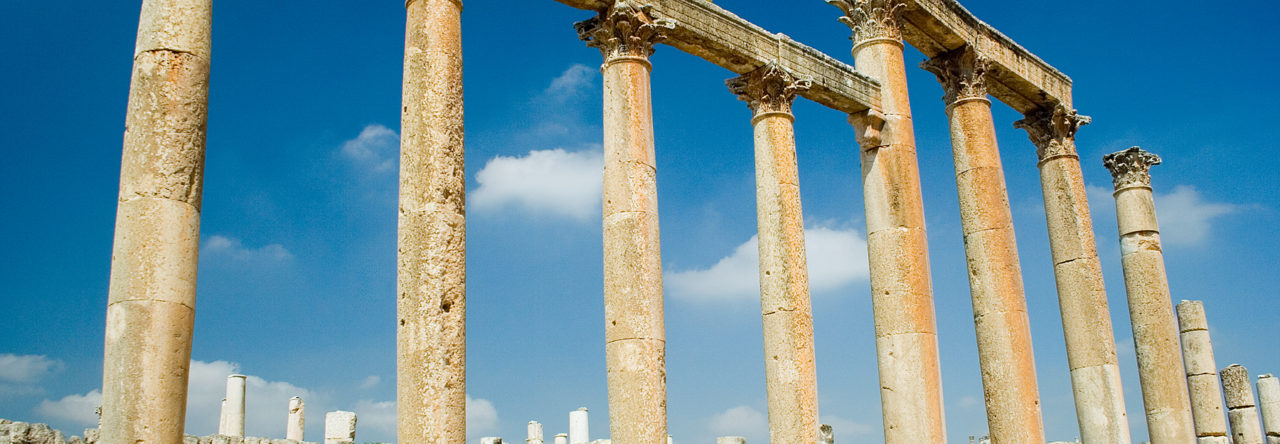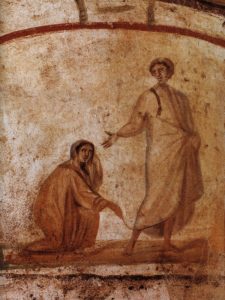 Not long ago, I wrote about healthcare from a biblical perspective. Since Jesus didn’t have health insurance, I had to make inferences and draw conclusions about that from what he says about those who are sick and in need. Now our newly inaugurated leader has issued a proclamation denying entry to Muslims from seven countries. Fortunately for us, the Bible addresses this subject much more directly with multiple passages about the treatment of foreigners. As Christians we are commanded to be welcoming to people from foreign lands, for Christ Himself was a refugee.
Not long ago, I wrote about healthcare from a biblical perspective. Since Jesus didn’t have health insurance, I had to make inferences and draw conclusions about that from what he says about those who are sick and in need. Now our newly inaugurated leader has issued a proclamation denying entry to Muslims from seven countries. Fortunately for us, the Bible addresses this subject much more directly with multiple passages about the treatment of foreigners. As Christians we are commanded to be welcoming to people from foreign lands, for Christ Himself was a refugee.
According to the Gospel of St. Matthew, Herod, the king of Judea ordered that all boys under the age of two in Bethlehem be put to death. An angel warns Joseph and with Mary and Jesus, he leaves for Egypt, where he was kept safe and not denied entry.
When they had gone, an angel of the Lord appeared to Joseph in a dream. “Get up,” he said, “take the child and his mother and escape to Egypt. Stay there until I tell you, for Herod is going to search for the child to kill him.”
So he got up, took the child and his mother during the night and left for Egypt, – Matthew 2:13-14
One might say that that we are in a different situation. Joseph and Mary were parents with a young child. Some of our leaders even claim that the current refugees are not families, but strong young men with violent intentions. As it turns out, that assertion is objectively false. According to our own statistics, the bulk of these refugees are children and not even one in fifty are single young men. Yet in that same gospel, Jesus does not make any such distinction. He tells us that our treatment of him is reflected in our treatment of strangers, not according to their age, sex, or potential for threat, but according to their need.
“Then the King will say to those on his right, ‘Come, you who are blessed by my Father; take your inheritance, the kingdom prepared for you since the creation of the world. For I was hungry and you gave me something to eat, I was thirsty and you gave me something to drink, I was a stranger and you invited me in, I needed clothes and you clothed me, I was sick and you looked after me, I was in prison and you came to visit me.’
“Then the righteous will answer him, ‘Lord, when did we see you hungry and feed you, or thirsty and give you something to drink? When did we see you a stranger and invite you in, or needing clothes and clothe you? When did we see you sick or in prison and go to visit you?’
“The King will reply, ‘Truly I tell you, whatever you did for one of the least of these brothers and sisters of mine, you did for me.’ ” – Matthew 25:34-40
It is very clear that the King in the story that Jesus tells stands for God Himself, and those of us who follow his teachings are called to help those in need. He tells us that when we welcome the stranger, we welcome Him. Currently that stranger is no mere traveler, but families like His own, fleeing from war and persecution. Jesus is very clear how we must handle this crisis: with open arms.
In the Old Testament portion of the Bible, God is even more direct. He commands us in the imperative to welcome foreigners, and to treat them as we do our own citizens.
When a foreigner resides among you in your land, do not mistreat them. The foreigner residing among you must be treated as your native-born. Love them as yourself, for you were foreigners in Egypt. I am the Lord your God. – Leviticus 19:33-34
For the Lord your God is God of gods and Lord of lords, the great God, mighty and awesome, who shows no partiality and accepts no bribes. He defends the cause of the fatherless and the widow, and loves the foreigner residing among you, giving them food and clothing. And you are to love those who are foreigners, for you yourselves were foreigners in Egypt. – Deuteronomy 10:17-19
“You are to distribute this land among yourselves according to the tribes of Israel. You are to allot it as an inheritance for yourselves and for the foreigners residing among you and who have children. You are to consider them as native-born Israelites; along with you they are to be allotted an inheritance among the tribes of Israel. In whatever tribe a foreigner resides, there you are to give them their inheritance,” declares the Sovereign Lord. – Ezekiel 47:21-23
Aid vs Security
The arguments against helping refugees typically center around terrorism and the supposed risk presented by allowing them to enter the United States. However, since 1980, when the United States standardized refugee processing, there has not been a refugee involved in a terrorist attack. The risk of terrorism from refugees is one of Hollywood movies and imagination.
And even if there were a great risk, as Christians, we are instructed to help them without regard to our own sacrifice.
No one should seek their own good, but the good of others. – 1 Corinthians 10:24
A new command I give you: Love one another. As I have loved you, so you must love one another. – John 13:34
We know how Jesus loved us. Allowing Muslim refugees into the safety of the United States does not require that kind of sacrifice. It merely requires that we let go of our fears and do what is right.
So do not fear, for I am with you;
do not be dismayed, for I am your God.
I will strengthen you and help you;
I will uphold you with my righteous right hand. – Isaiah 41:10
Jesus teaches the same lesson in the parable of the good Samaritan. That phrase “Good Samaritan” has become common in English in reference to this story and the word “Samaritan,” in America, often simply means something like “good person” or someone who has performed some act of service. But in ancient Judea, where Jesus was teaching, the Samaritans were an ethnic and religious group distinct from the Jewish majority. Although their religious traditions were connected, they were regarded with suspicion and discriminated against. To fully understand the story, you need to understand that context. If Jesus were teaching this lesson to modern Americans, it stands to reason that the hero of this story might be a Muslim.
On one occasion an expert in the law stood up to test Jesus. “Teacher,” he asked, “what must I do to inherit eternal life?”
“What is written in the Law?” he replied. “How do you read it?”
He answered, “‘Love the Lord your God with all your heart and with all your soul and with all your strength and with all your mind’; and, ‘Love your neighbor as yourself.’ ”
“You have answered correctly,” Jesus replied. “Do this and you will live.”
But he wanted to justify himself, so he asked Jesus, “And who is my neighbor?”
In reply Jesus said: “A man was going down from Jerusalem to Jericho, when he was attacked by robbers. They stripped him of his clothes, beat him and went away, leaving him half dead. A priest happened to be going down the same road, and when he saw the man, he passed by on the other side. So too, a Levite, when he came to the place and saw him, passed by on the other side. But a Samaritan, as he traveled, came where the man was; and when he saw him, he took pity on him. He went to him and bandaged his wounds, pouring on oil and wine. Then he put the man on his own donkey, brought him to an inn and took care of him. The next day he took out two denarii and gave them to the innkeeper. ‘Look after him,’ he said, ‘and when I return, I will reimburse you for any extra expense you may have.’
“Which of these three do you think was a neighbor to the man who fell into the hands of robbers?”
The expert in the law replied, “The one who had mercy on him.”
Jesus told him, “Go and do likewise.”
Go And Do Likewise
It doesn’t matter whom you voted for. It doesn’t matter what party you’re in. You can still help these people. This order is unjust, un-Christian, and un-American. It must be opposed.
- Call your congressional representatives
- Donate to the ACLU. You don’t have to agree with everything they do, but they are helping here.
- Physically attend a protest. Show the government that this does not reflect American values.

